The AMD 2nd Gen Ryzen Deep Dive: The 2700X, 2700, 2600X, and 2600 Tested
by Ian Cutress on April 19, 2018 9:00 AM ESTCPU Encoding Tests
One of the interesting elements on modern processors is encoding performance. This includes encryption/decryption, as well as video transcoding from one video format to another. In the encrypt/decrypt scenario, this remains pertinent to on-the-fly encryption of sensitive data - a process by which more modern devices are leaning to for software security. Video transcoding as a tool to adjust the quality, file size and resolution of a video file has boomed in recent years, such as providing the optimum video for devices before consumption, or for game streamers who are wanting to upload the output from their video camera in real-time. As we move into live 3D video, this task will only get more strenuous, and it turns out that the performance of certain algorithms is a function of the input/output of the content.
All of our benchmark results can also be found in our benchmark engine, Bench.
7-Zip 9.2: link
One of the freeware compression tools that offers good scaling performance between processors is 7-Zip. It runs under an open-source licence, is fast, and easy to use tool for power users. We run the benchmark mode via the command line for four loops and take the output score.
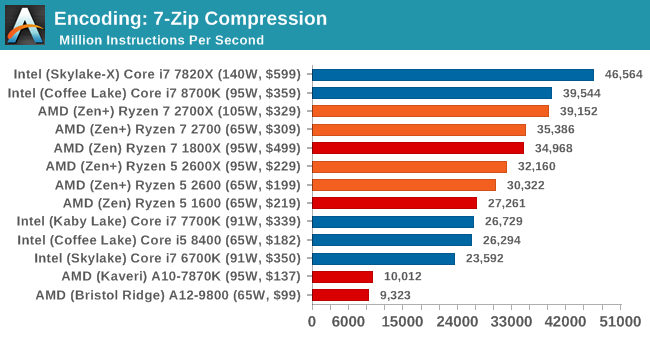
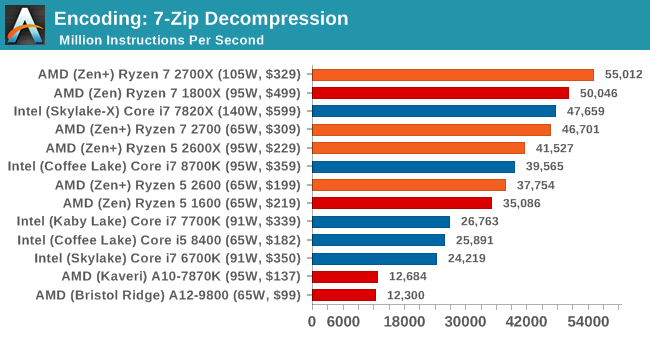
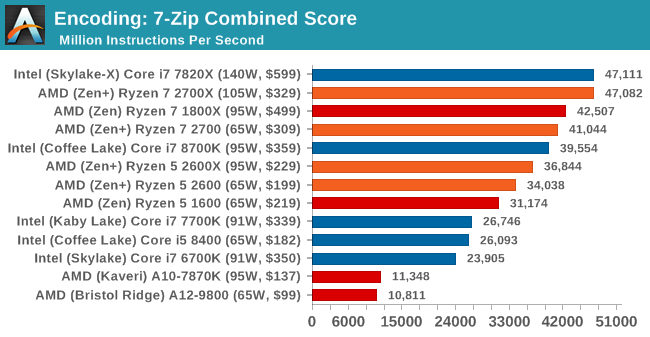
WinRAR 5.40: link
For the 2017 test suite, we move to the latest version of WinRAR in our compression test. WinRAR in some quarters is more user friendly that 7-Zip, hence its inclusion. Rather than use a benchmark mode as we did with 7-Zip, here we take a set of files representative of a generic stack (33 video files in 1.37 GB, 2834 smaller website files in 370 folders in 150 MB) of compressible and incompressible formats. The results shown are the time taken to encode the file. Due to DRAM caching, we run the test 10 times and take the average of the last five runs when the benchmark is in a steady state.
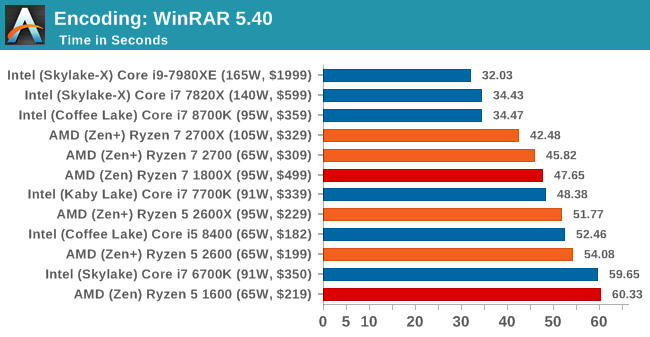
WinRAR requires a good memory base, so we see the quad-channel processors heading up the pack. The high IPC of the Core i7-8700K also does well.
AES Encoding
Algorithms using AES coding have spread far and wide as a ubiquitous tool for encryption. Again, this is another CPU limited test, and modern CPUs have special AES pathways to accelerate their performance. We often see scaling in both frequency and cores with this benchmark. We use the latest version of TrueCrypt and run its benchmark mode over 1GB of in-DRAM data. Results shown are the GB/s average of encryption and decryption.
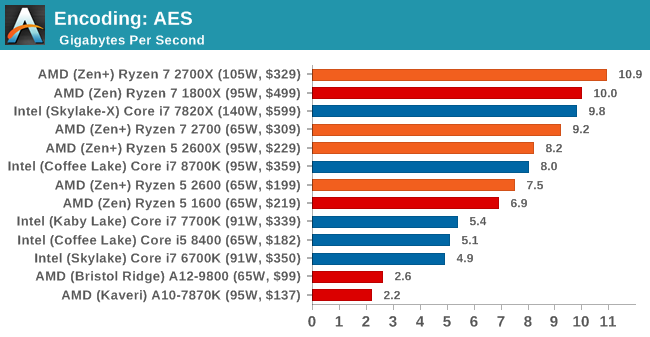
HandBrake v1.0.2 H264 and HEVC: link
As mentioned above, video transcoding (both encode and decode) is a hot topic in performance metrics as more and more content is being created. First consideration is the standard in which the video is encoded, which can be lossless or lossy, trade performance for file-size, trade quality for file-size, or all of the above can increase encoding rates to help accelerate decoding rates. Alongside Google's favorite codec, VP9, there are two others that are taking hold: H264, the older codec, is practically everywhere and is designed to be optimized for 1080p video, and HEVC (or H265) that is aimed to provide the same quality as H264 but at a lower file-size (or better quality for the same size). HEVC is important as 4K is streamed over the air, meaning less bits need to be transferred for the same quality content.
Handbrake is a favored tool for transcoding, and so our test regime takes care of three areas.
Low Quality/Resolution H264: Here we transcode a 640x266 H264 rip of a 2 hour film, and change the encoding from Main profile to High profile, using the very-fast preset.
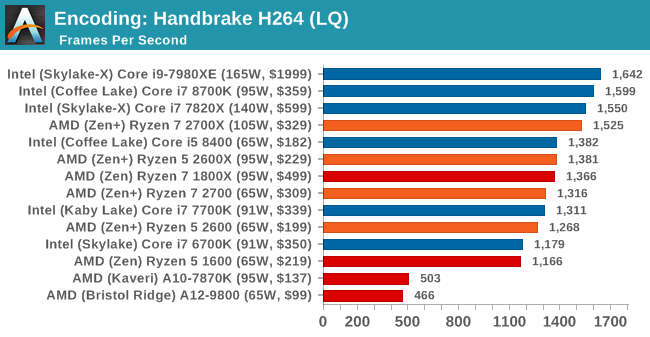
High Quality/Resolution H264: A similar test, but this time we take a ten-minute double 4K (3840x4320) file running at 60 Hz and transcode from Main to High, using the very-fast preset.
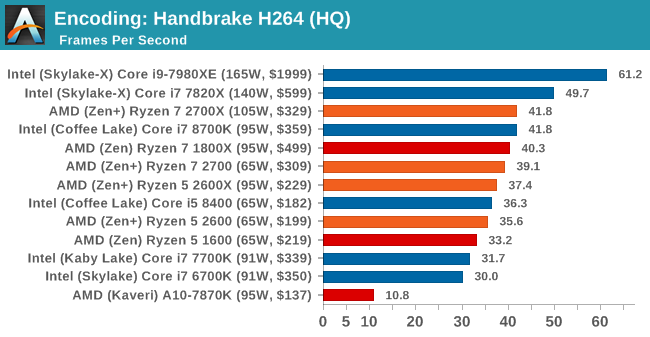
HEVC Test: Using the same video in HQ, we change the resolution and codec of the original video from 4K60 in H264 into 4K60 HEVC.
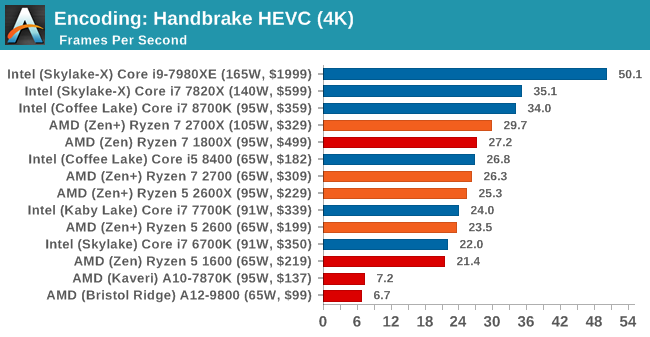
For HandBrake video encoding of large frames, there is a bump with the new Ryzen-2000 series processors over the previous generation, however there is still a gap up to the Core i7-8700K. The Core i5-8400 puts in a good showing here, above all but the best Ryzen parts.










545 Comments
View All Comments
Marlin1975 - Thursday, April 19, 2018 - link
Looks good, guess AMD will replace my Intel system next.Just waiting for GPU and memory prices to fall.
3DoubleD - Thursday, April 19, 2018 - link
Agreed... the waiting continuesWorldWithoutMadness - Thursday, April 19, 2018 - link
Lol, you might even wait until Zen 2 comes out next year or even later.Dragonstongue - Thursday, April 26, 2018 - link
should be out next year as AMD has been very much on the ball with Ryzen launches more or less to the DAY they claimed would launch which is very nice...basically what they are promising for product delivery they are doing what they say IMO, not to mention TSMC recently announced volume production of their 7nm, so that likely means GloFo will be very soon to follow, and AMD can use TSMC just the same :)t.s - Tuesday, July 31, 2018 - link
What @WWM want to say is: You can wait forever for the RAM price to go down, rather than when ryzen 2 out.StevoLincolnite - Thursday, April 19, 2018 - link
I still haven't felt limited by my old 3930K yet.Can't wait to see what Zen 2 brings and how Intel counters that.
mapesdhs - Friday, April 20, 2018 - link
If you ever do fancy a bit more oomph in the meantime (and assuming IPC is less important than threaded performance, eg. HandBrake is more important than PDF loading), a decent temporary sideways step for X79 is a XEON E5-2697 v2 (IB-EP). An oc'd 3930K is quicker for single-threaded of course, but for multithreaded the XEON does very well, easily beating an oc'd 3930K, and the XEON has native PCIe 3.0 so no need to bother with the not entirely stable forced NVIDIA tool. See my results (for FireFox, set Page Style to No Style in the View menu):http://www.sgidepot.co.uk/misc/tests-jj.txt
mapesdhs - Monday, April 23, 2018 - link
Correction, I meant the 2680 v2.Samus - Friday, April 20, 2018 - link
I never felt limited by my i5-4670k either, especially mildly overclocked to 4.0GHz.Until I build a new PC around the same old components because the MSI Z97 motherboard (thanks MSI) failed (it was 4 years old but still...) so I picked up a new i3-8350k + ASRock Z270 at Microcenter bundled together for $200 a month ago, and it's a joke how much faster it is than my old i5.
First off, it's noticeably faster, at STOCK, than the max stable overclock I could get on my old i5. Granted I replaced the RAM too, but still 16GB, now PC4-2400 instead of PC3-2133. Doubt it makes a huge difference.
Where things are noticeably faster comes down to boot times, app launches and gaming. All of this is on the same Intel SSD730 480GB SATA3 I've had for years. I didn't even do a fresh install, I just dropped it in and let Windows 10 rebuild the HAL, and reactivated with my product key.
Even on paper, the 8th gen i3's are faster than previous gen i5's. The i3 stock is still faster than the 4th gen i5 mildly overclocked.
I wish I waited. It's compelling (although more expensive) to build an AMD Ryzen 2 now. It really wasn't before, but now that performance is slightly better and prices are slightly lower, it would be worth the gamble.
gglaw - Saturday, April 21, 2018 - link
i think there's something wrong with your old Haswell setup if the difference is that noticeable. I have every generation of Intel I7 or I5 except Coffee Lake running in 2 rooms attached to each other, and I can't even notice a significant difference from my SANDY 2600k system with a SATA 850 Evo Pro sitting literally right next to my Kaby I7 with a 960 EVO NVMe SSD. I want to convince myself how much better the newer one is, but it just isn't. And this is 5 generations apart for the CPU's/mobos and using one of the fastest SSD's ever made compared to a SATA drive, although about the fastest SATA drive there is. Coffee Lake is faster than Kaby but so tiny between the equivalent I7 to I7, I can't see myself noticing a major difference.In the same room across from these 2 is my first Ryzen build, the 1800X also with an 960 EVO SSD. Again, I can barely convince myself it's a different system than the Sandy 2600k with SATA SSD. I have your exact Haswell I5 too, and it feels fast as hell still. Especially for app launches and gaming. The only time I notice major differences between these systems is when I'm encoding videos or running synthetic benchmarks. Just for the thrill of a new flagship release I just ordered the 2700X too and it'll be sitting next to the 1800X for another side by side experience. It'll be fun to setup but I'm pretty convinced I won't be able to tell the 2 systems apart when not benchmarking.